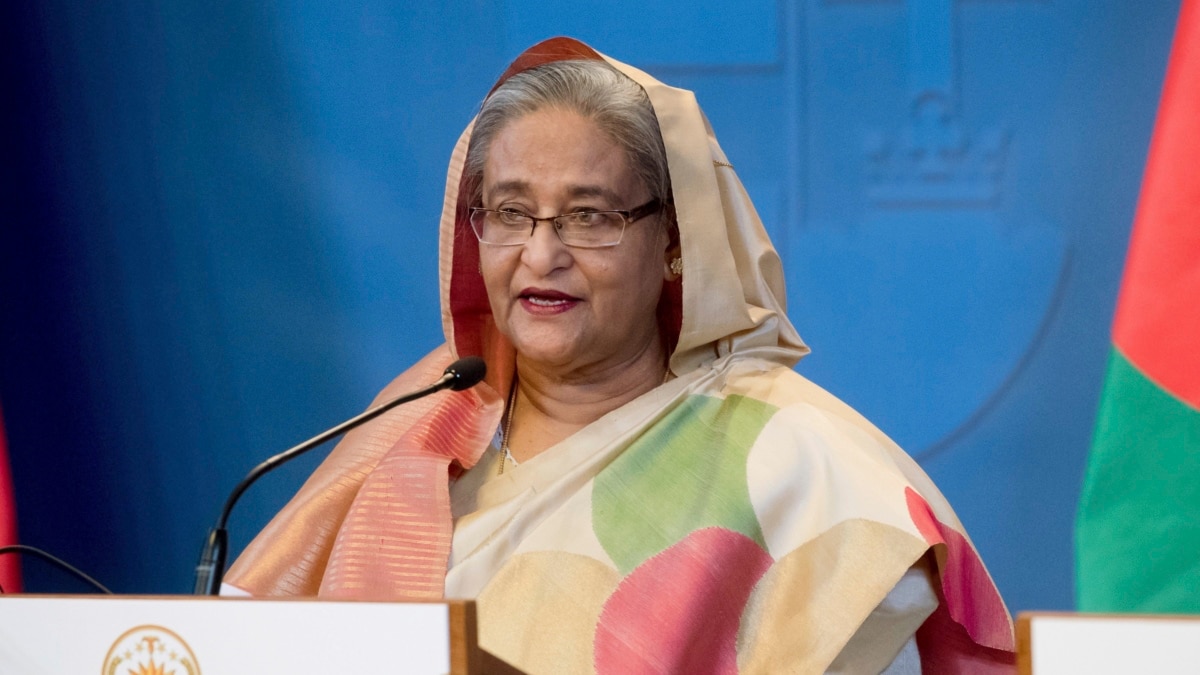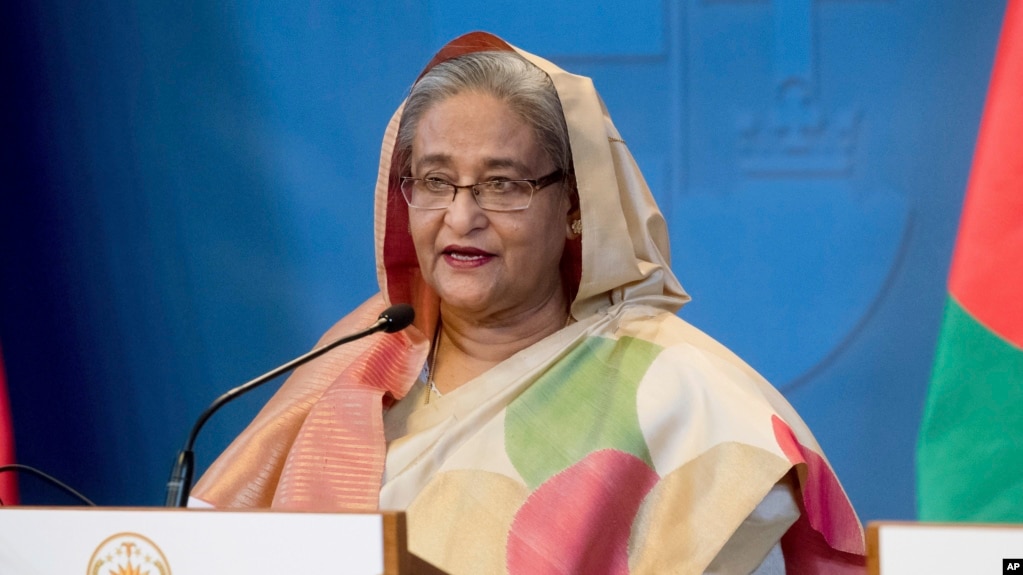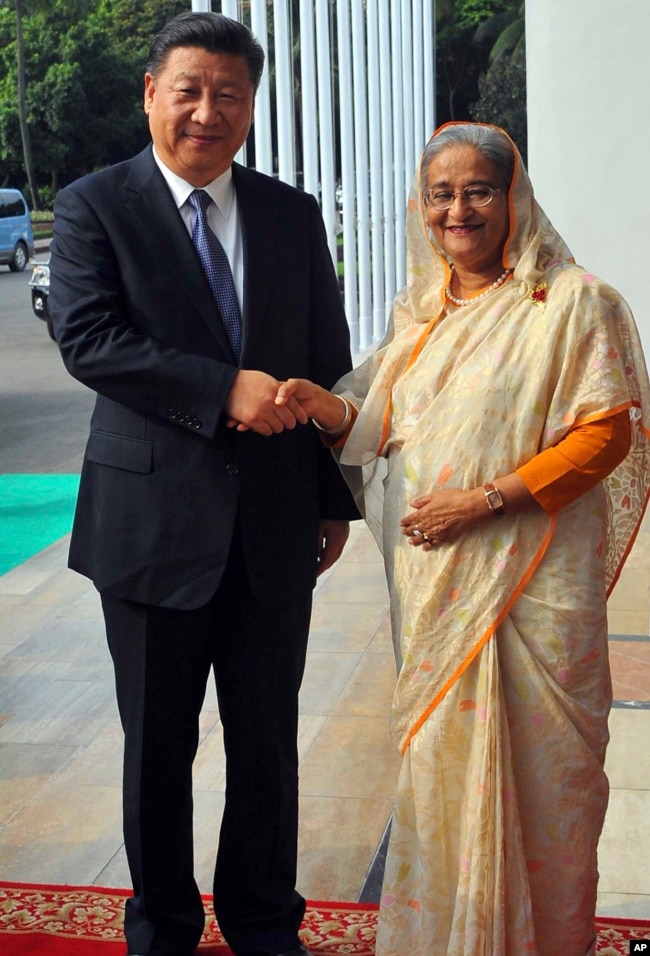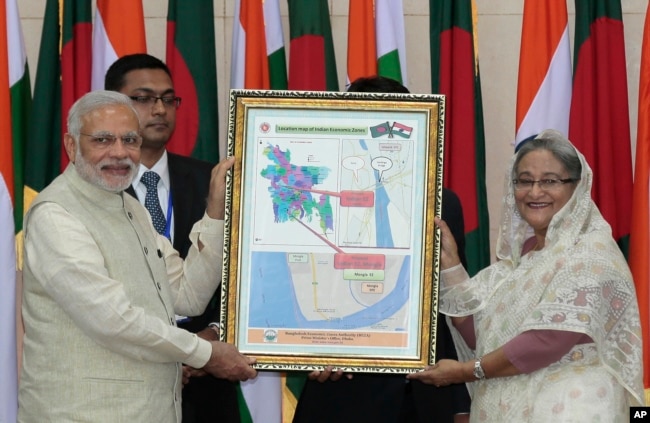- Sep 12, 2024
- 388
- 126
- Origin

- Residence

- Axis Group

Now, now, children. Settle down.
Follow along with the video below to see how to install our site as a web app on your home screen.

Note: this_feature_currently_requires_accessing_site_using_safari





Many in Bangladesh Oppose Proposed Defense Pact With India
Bangladesh does not need a defense pact, and signing one could raise objections in China, with which Dhaka has collaborated over the years, an ex-diplomat sayswww.voanews.com
Many in Bangladesh Oppose Proposed Defense Pact With IndiaApril 06, 2017 9:00 PM

FILE - Bangladeshi Prime Minister Sheikh Hasina speaks at a news conference in Budapest, Hungary, Nov. 29, 2016. Leaders of the opposition Bangladesh Nationalist Party have accused the Hasina-led government of not making public details of an agreement she's set to sign with India.
New Delhi and Dhaka are set to sign an umbrella agreement to increase defense cooperation during Bangladesh Prime Minister Sheikh Hasina's four-day visit to India, which begins Friday.
All deals would be struck maintaining the friendly terms between the two countries, and there will be nothing detrimental to the interests of Bangladesh in the agreement, Hasina said Wednesday in Dhaka.
But many security experts, diplomats and others in Bangladesh think the proposed agreement would not benefit Bangladesh and could even go against the country's interests.
"Bangladesh does not need a defense pact with India, or for that matter with any other country, because it does not face any threat of external aggression from any of its neighbors," Serajul Islam, a former Bangladeshi diplomat, told VOA. "With China, a sworn enemy of India, Bangladesh has been in defense-related cooperation for decades. If Bangladesh signs such a defense pact [with India], it would be viewed by Beijing as a deal directed against it."
Where are the details?
Leaders of the opposition Bangladesh Nationalist Party accused the Hasina-led government of not making public details of the agreement.
"From whatever we have learned from the media, it appears Indian policymakers are coercing Bangladesh government to sign the agreement," BNP Joint Secretary General Ruhul Kabir Rizvi Ahmed told VOA. "The submission by the Bangladesh government to this Indian coercion has triggered an uneasiness and suspicion among people in the country."
Bangladesh has long had a defense cooperation agreement with China, which is the country's largest military hardware supplier. With Chinese collaboration, Bangladesh also has been producing small arms and weapons for many years.

FILE - Bangladesh’s Prime Minister Sheikh Hasina and Indian Prime Minister Narendra Modi hold a location map of Indian Economic Zones during an agreement program in Dhaka, Bangladesh, June 6, 2015.
In recent years, India has been trying to counter China's growing influence in the region.
Soon after Chinese President Xi Jinping visited Dhaka in October, signing 27 deals amounting to $25 billion, India reportedly began pushing Bangladesh for an umbrella agreement.
After India's Defense Minister Manohar Parikkar visited Bangladesh in December, and then other senior Indian foreign and defense ministry officials made trips to India pursuing the issue, it came to light that Dhaka and New Delhi were set to sign an umbrella agreement.
35 deals
According to sketchy details of the pact, Bangladesh would sign up to 35 agreements and memoranda of understanding during Hasina's visit.
The deals would include, among others, an increase in trade, cooperation on nuclear energy, distribution of water from common rivers and expansion of military cooperation, Bangladesh Foreign Minister Abul Hasan Mahmood Ali said this week.
As part of the umbrella accord, India is expected to offer Bangladesh a $5 billion line of credit to develop infrastructure and purchase military hardware. Quoting anonymous sources, several Bangladeshi news agencies have reported that India will be mostly focused on the defense pact during Hasina's visit.
India is pushing ahead with the agreement largely to counter China's expanding military influence in Bangladesh, said professor Rajagopal Dhar Chakraborti, director of the Center for South & South East Asian Studies at the University of Calcutta.

"India wants Bangladesh to buy Indian military hardware and thus become less dependent on China. India wants to enter the defense market in Bangladesh, preferably through a long-term pact, aiming to cut down on China's share there," Chakraborti told VOA.
The India-Bangladesh umbrella agreement also seeks to set up joint military production in Bangladesh.
A Bangladeshi security analyst, retired Major General A.L.M. Fazlur Rahman, said a joint venture with India, apparently to produce small arms and light heavy weapons, would not help Bangladeshi militarily.
Needs would be unmet
"Since the 1970s, following the liberation of our country, our army have been using mostly Chinese-made small arms and light heavy weapons. We have also been producing arms in our ordnance factory in Bangladesh in collaboration with China, using the same world-class Chinese technology. India's military technology is not yet world-class standard, and it happens to be an arms-importing country," Rahman told VOA.
"Setting up of a joint venture armament factory with India will certainly produce low-grade weaponry and will not at all help meet the advanced needs of Bangladesh army," he said. "As an old trusted friend, China supplies 90 percent of Bangladesh's military hardware needs and is set to invest massively in our country. If Bangladesh signs this agreement with India, we may lose this friend and become weak."
On the other hand, Bangladesh can continue to remain a good neighbor of India, even without signing this strategically sensitive agreement, Rahman said.
"Bangladesh should not do anything which makes it lose a friend like China and become dependent solely on India," he said.
I think India has a grand plan to portray Bangladesh as a land of Islamic extremists. If we fail to prove India wrong, the Indian army may invade Bangladesh with an excuse of protecting the Hindus in Bangladesh.
বাংলাদেশের সেনাপ্রধানের সাথে হঠাৎ ভারতীয় সেনাপ্রধানের ভিডিও কল কিসের ইঙ্গিত ?
Even if you invade you won't succeed. In 1971, you had to face just 5 divisions of Pakistani army whereas now in 2024 you have to face 10 divisions of Bangladesh army with modern weapons. In 1971, 75 million East Pakistanis were with you in your endeavor to defeat the Pakistani army but now in 2024 you will be lynched by the 180 million Bangladeshis if you engage in a war with Bangladesh army.Protect Hindus and other minorities we will.
Like we protected you once upon a time.
But what is the end goal of us invading you?
Land corridor?
A Hindu buffer zone perimeter?
It is highly unthinkable (in fact it will cause civil unrest and anarchy internally) that we will take in 170 million new Muslims.
Even if you invade you won't succeed. In 1971, you had to face just 5 divisions of Pakistani army whereas now in 2024 you have to face 10 divisions of Bangladesh army with modern weapons. In 1971, 75 million East Pakistanis were with you in your endeavor to defeat the Pakistani army but now in 2024 you will be lynched by the 180 million Bangladeshis if you engage in a war with Bangladesh army.
What does rhat mean?All rhat is fine.
We will see when and if the time comes.
But that was not my question.
My question was, why would India invade you.
What dies India want from that. What is India's objective.
What does rhat mean?
By invading Bangladesh India would want to create a permanent alternative to its chicken's neck which will ultimately secure its north-east from Chinese invasion.






I think you might be generalizing.. those you encountered must be weak southies
Punjab, Haryana are next level






This is true to a large degree. The east punjabis have a strong affinity toward Pakistan and basically they are the same people.@Bilal9 @Saif
And, we should understand that Sikhs are different to other Indic groups in India. Remember, most of the travelled from Pakistan into India during 1947 from Pakistan's Punjab area - which was the hotbed of Sikhism and its growth.
They are much more mixed in DNA than other Indic groups with many of the intermingling with the Afghans due to constant Afghan - Sikh wars and other Iranic and Central Asian groups.
@ThunderCat @FullNight2381 @Lulldapull @VCheng

Even if you invade you won't succeed. In 1971, you had to face just 5 divisions of Pakistani army whereas now in 2024 you have to face 10 divisions of Bangladesh army with modern weapons. In 1971, 75 million East Pakistanis were with you in your endeavor to defeat the Pakistani army but now in 2024 you will be lynched by the 180 million Bangladeshis if you engage in a war with Bangladesh army.